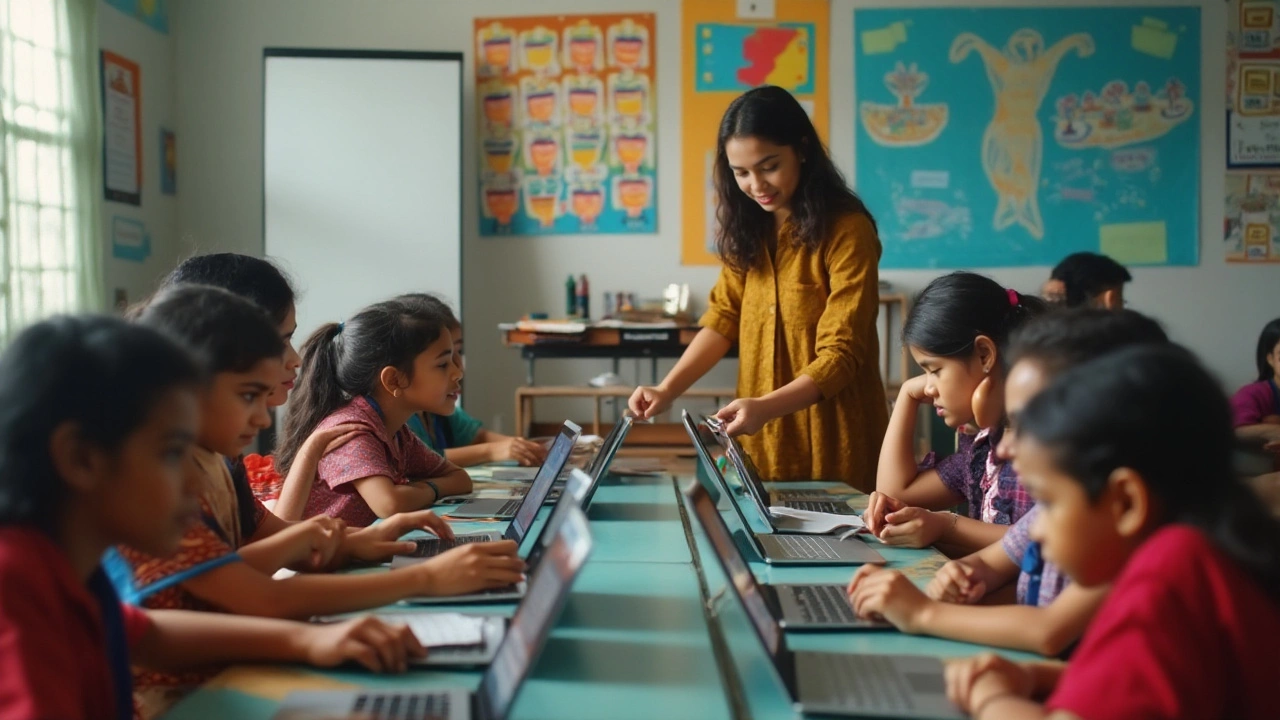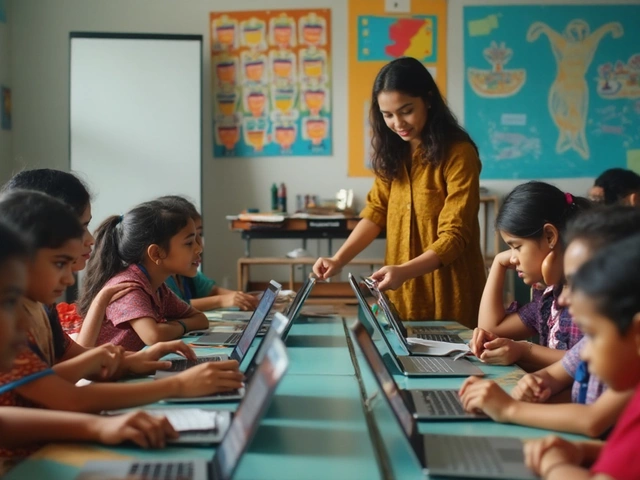The world of education is ever-evolving, driven by the dynamic changes in society's needs and technological advances. Teachers, as the backbone of this transformation, play a critical role in shaping future generations. With schools striving to keep pace, it's no wonder certain educators are in higher demand than others.
In 2025, the educational sector is placing a premium on teachers who can adapt to digital tools, cater to diverse classrooms, and passionately engage with specialized subjects. These demands reflect the broader shifts in how we approach teaching and learning, pushing educators to refine their skills and embrace innovation.
As the demand grows, those considering a career in education or seeking to enhance their existing skill set should focus on these areas. Let's delve into which roles are capturing the spotlight and why they matter so much today.
- Technology-Savvy Educators
- Specialized Subject Teachers
- Inclusive Education Professionals
- Online and Hybrid Learning Facilitators
- Mentors and Emotional Support Advocates
Technology-Savvy Educators
The role of technology-savvy educators has become essential, as digital tools reshape the learning environment. Teachers equipped with technological skills are not only facilitators of learning but pioneers who unlock the boundless potential of digital landscapes. Schools and educational institutions now seek educators who can seamlessly integrate technology into their teaching, making lessons more engaging, interactive, and accessible. The rise of virtual classrooms and e-learning platforms has accelerated this trend, pushing teachers to go beyond traditional methods and explore new horizons in education.
Educators who are adept at using technology understand the art of blending educational content with digital tools. This means incorporating multimedia elements like videos, podcasts, and interactive simulations to enhance the learning experience. These teachers find innovative ways to use apps and software that cater to a variety of learning styles, ensuring each student can grasp the material in a manner that suits them best. As the educational sector embraces these advancements, it's crucial for teachers to stay updated with the latest technological trends and tools, ensuring they remain an integral part of the modern classroom.
Teaching demand for such educators isn't just about using advanced gadgets; it's about understanding the pedagogical impact of technology. Schools are looking for teachers who can use technology to cultivate critical thinking, problem-solving, and collaboration among students. Encouraging active participation through digital means fosters a dynamic learning culture, making education a two-way street rather than a lecture-dominated scenario. News articles often highlight how successful integration of technology can improve classroom outcomes significantly, demonstrating its value in education.
"Technology should not drive the learning; educators should integrate technology as a tool to engage learning," says John Thomas, an educational technologist. This philosophy underscores the importance of technology as an enhancer rather than a driver of the learning process.
There are numerous platforms where teachers can gain skills to become proficient with educational technologies. From free online courses to professional development workshops, opportunities abound for those keen to dive into the in-demand teachers' scene. Certifications specific to educational technology, such as Google Certified Educator or Apple's Teacher program, can add significant value to a teacher's resume, showcasing their competence in this domain.
Adapting to New Technologies
One of the key challenges is staying ahead of technological advancements. The speed at which new devices and platforms emerge can be overwhelming. Teachers must remain flexible and committed to lifelong learning, constantly seeking out new tools that can benefit their students. In the rush to adopt technology, it’s also vital to recognize the need for digital literacy among students. Teaching not only the ‘how’ but the ‘why’ of technology use prepares them for future success in any career path they choose.
In heightening students' engagement, visuals, and real-time feedback mechanisms form part of the strategy. A simple, yet effective approach is using platforms that offer immediate assessment quizzes and interactive feedback, helping students and educators track progress instantly. Data suggests classrooms using such tools see up to a 15% improvement in student engagement and understanding, as reflected in the table below:
| Tool | Improvement in Engagement |
|---|---|
| Interactive Quizzes | 10% |
| Real-time Feedback | 15% |
| Multimedia Lessons | 12% |
Ultimately, the role of technology-savvy educators in 2025 is not simply about using technological tools, but about transforming learning into an interactive, inclusive, and inspiring experience. For teachers ready to embrace this shift, the journey requires dedication, creativity, and a willingness to continuously adapt and learn. Yet the rewards, seen in more engaged students and enriched learning environments, make the effort worthwhile.
Specialized Subject Teachers
In the landscape of modern education, the role of specialized subject teachers has gained unprecedented importance. As academic curricula expand to include a wider range of disciplines, schools are increasingly on the lookout for educators who bring expertise and enthusiasm to their particular niche. Whether it’s STEM (Science, Technology, Engineering, and Mathematics), foreign languages, or emerging fields like environmental science and media studies, these teachers help students delve deep into subjects that may shape the course of their future careers.
In recent years, with the rapid technological advancements, there's been a noticeable spike in demand for teachers proficient in computer science and information technology. These educators equip students with skills necessary for navigating a world where digital literacy is as crucial as traditional literacy. It's not just about teaching students to code; it’s about fostering a mindset of logical thinking and problem solving. According to the Bureau of Labor Statistics, employment of computer and information technology occupations is projected to grow 11 percent from 2019 to 2029, much faster than the average for all occupations, fueling the demand for teachers in this field.
Teachers who specialize in foreign languages are also highly sought after, as globalization encourages cross-cultural communication and understanding. Educators fluent in Mandarin, Spanish, and Arabic, among others, can open the world to students by teaching them not just the mechanics of language, but also the cultural contexts that give language its life. A proficient language teacher can inspire students to embrace diversity and see the world through different lenses, skills which are invaluable in our interconnected world.
Moreover, with growing awareness about environmental issues, the need for educators specializing in environmental science has become a necessity. These teachers guide students through complex topics such as climate change, sustainability, and conservation. They help form a generation that’s not only aware of these critical issues but are driven to seek innovative solutions. A report from the Environmental and Energy Study Institute underscores the increasing incorporation of eco-conscious curricula in schools, which highlights the critical need for knowledgeable teachers in this area.
Specialized subject teachers indeed bring a wealth of knowledge and perspective to education, making them indispensable in today's academic institutions. Their unique contributions go beyond textbooks, fostering understanding and skills that resonate with real-world applications. As Geetha Narayan, an education consultant, notes,
"Specialized teachers play a crucial role in not just educating, but guiding students through ever-changing landscapes of their chosen subjects. Their impact can last a lifetime."Investing in specialized subject teaching is not just essential for students but for society's progress as a whole.

Inclusive Education Professionals
As education continues to move towards more equitable practices, inclusive education professionals are becoming pivotal in classrooms across the globe. These educators specialize in creating learning environments where every student, regardless of their physical, intellectual, emotional, or linguistic diversity, has equal access to learning opportunities. Their role is to ensure that schools are places where differences are celebrated, not stigmatized, aligning closely with modern educational values.
One of the most important aspects of their work is collaborating with general education teachers to modify curriculum and instruction to meet the diverse needs of all students. This often involves developing individualized education plans (IEPs) for students who require additional support, incorporating assistive technologies, and employing various instructional strategies to cater to a wide range of learning styles. They are adept at using technology in the classroom, ensuring that learning tools such as tablets and other multimedia resources are accessible to all learners. This adaptability to technology not only aids students with specific needs but also enhances the learning experience for everyone in the classroom.
In recent years, there's been significant growth in the number of resources available to support inclusive education. According to a UNESCO report, schools that implement inclusive practices tend to see improved academic results, enhanced social interactions, and a stronger sense of belonging among students. This shift is reflective of an increasing understanding that when educational strategies are designed to accommodate the varied needs of different learners, all students benefit. A teacher quoted in the report explains, "It's not just about helping some kids to catch up. It's about enriching the classroom for everyone."
Establishing an inclusive classroom requires sensitivity and a deep understanding of each student's unique challenges and strengths. Professionals in this field regularly engage in professional development to stay updated on the best practices and tools available. They often work closely with families and external specialists in order to create a robust support system for their students. This collaboration extends to helping educate peers about inclusivity, fostering a culture of acceptance and empathy in the school environment.
Through specialized training, inclusive education professionals learn to identify and dismantle barriers that prevent some students from participating fully. They use data-driven analyses to monitor student progress and adapt teaching strategies accordingly. The presence of these professionals in schools underscores a commitment to a more balanced and fair educational system. Their impact not only alters the academic trajectory of individual students but also prepares all students to thrive in a diverse world.
While being an inclusive education professional can be demanding, those who work in this field often express a profound sense of fulfillment. For them, the most rewarding aspect is witnessing the incredible transformations that occur when each student's voice is heard and valued. As schools continue to evolve, the demand for these dedicated professionals is set to rise, underscoring their integral role in modern education systems.
Online and Hybrid Learning Facilitators
In recent years, the demand for online and hybrid learning facilitators has skyrocketed, reshaping the educational landscape. As technology continues to evolve rapidly, teachers equipped with a strong command of digital tools and platforms have become invaluable assets to schools worldwide. These educators are not just teachers in the traditional sense, but pioneers who bring dynamic and innovative teaching methods to the digital classroom. Their role involves guiding students through a blended learning environment that combines the best of both online and in-person education. This approach, particularly favored in 2025, seeks to provide flexible, personalized learning experiences that cater to diverse student needs. The appeal of such educators lies in their ability to harness technology, using everything from virtual labs to immersive simulations, thus creating a rich learning environment that keeps students engaged and motivated.
Interestingly, a study by the International Society for Technology in Education (ISTE) noted that schools with strong online and hybrid learning programs report higher student satisfaction and engagement levels. This aligns with the emerging trend among educational institutions to embrace blended learning models. Students today demand greater autonomy over their educational paths, and this is where hybrid learning comes into play, offering them opportunities to learn at their own pace. It's a shift from the one-size-fits-all approach, making way for more customized learning pathways.
The role of an online and hybrid learning facilitator isn't solely about managing digital coursework; it involves a broad spectrum of responsibilities. Teachers in this realm must be adept at fostering community and connection in a virtual setting—a challenge in itself. They employ various learning management systems (LMS) to track student progress, assess needs, and tailor content that suits individual learning styles. Additionally, they play a critical part in equipping students with digital literacy skills necessary for the modern workforce. Their expertise ensures that educational content is not only accessible but also interactive and engaging.
Their prowess can be likened to that of a conductor in a symphony, seamlessly blending digital instruction with live interaction to create a harmonious learning experience for all," states Dr. Melissa Nguyen, an educator specializing in digital pedagogy.
One cannot underestimate the importance of professional development for teachers venturing into these new territories. Institutions often encourage ongoing training, workshops, and webinars that keep educators updated on the latest technological advancements. This continuous adaptation is crucial for any educator wishing to stay relevant in an ever-evolving digital landscape. For those aspiring to excel as online and hybrid learning facilitators, embracing change and innovation is not just recommended, it is a necessity. As we look ahead, it's clear this teaching role will continue to grow in prominence, with educators at the forefront of this movement shaping the future of learning.

Mentors and Emotional Support Advocates
In today's rapidly shifting educational landscape, the role of teachers as mentors and emotional support advocates has garnered significant attention. Schools worldwide acknowledge the mounting pressures students face, owing not just to academics but also to social and emotional challenges. Increasingly, teachers are being trained to guide students through these turbulent waters, nurturing their growth both in and out of the classroom. Such a shift marks a palpable transformation in education philosophy, recognizing that students' social-emotional learning (SEL) is as crucial as traditional academic subjects. In an age where mental health awareness is soaring, educational institutions are placing an unprecedented focus on this dual role of educators, thereby increasing the demand for such positions.
Experts believe that mentoring can bridge the gap between students and their educational goals. A study by the National Mentoring Partnership reported that young adults who had a mentor were 55% more likely to be enrolled in college. This statistic underscores the critical importance of mentoring in student career pathways. Teachers, therefore, are being equipped with skills to act as connectors, empowering students to achieve their fullest potential. When educators transform into mentors, they serve as role models, listening ears, and trustful companions, guiding students through personal layers of challenges. Such an approach is hardly one-size-fits-all; rather, it respects individual needs and encourages personalized guidance.
"Mentoring at its core is the provision of personal guidance, friendship, and a role model. It often catalyzes profound influence on a student's academic and life trajectory," suggests Dr. Stephen Chandler, a leading researcher in educational psychology.
Beyond mentoring, the emotional support facet has seen an upswell in importance. In today's world, where technology pervasively connects individuals but often diminishes genuine interpersonal interactions, emotional safety within schools is paramount. Research from the Collaborative for Academic, Social, and Emotional Learning (CASEL) indicates that education infused with social and emotional learning techniques can increase students' performance by 11 percentile points. These advocates of change not only address immediate student well-being but also contribute to long-term resilience and emotional intelligence. Educators skilled in offering emotional support create classrooms that are sanctuaries for learning and self-development. Such educators are adept at recognizing signs of distress, anxiety, or depression among youngsters, offering strategic interventions or counseling. Over time, these efforts foster an atmosphere of acceptance, support, and mutual respect among students, paving the way for holistic development.
The skill sets required for becoming effective mentors and emotional support advocates are diverse. Institutions are increasingly offering specialized teacher training programs dedicated to social-emotional learning and mentorship. These programs emphasize active listening, empathy, conflict resolution, and psychological first aid, among other skills, preparing educators to become the stable support pillars today’s students need. With a rise in demand for such trained professionals, educators are encouraged to pursue certifications or additional coursework in this domain to stand out. The transformative role teachers play extends beyond just knowledge transfer, emphasizing their critical function as facilitators for well-being and success. As the world marches on towards embracing comprehensive education, it's clear that emphasizing emotional support and mentorship will remain on the forefront, with these teachers steering the helm of educational progress.


